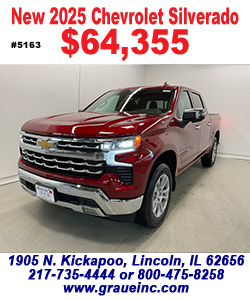Illinois legislators could advance pilot program to tax drivers by mile
[April 09, 2025]
By Catrina Barker | The Center Square contributor
(The Center Square) – Illinois drivers could be taxed by the mile under
a pilot program being considered at the statehouse.
Senate Bill 1938 is to be discussed by members of the Transportation
committee before April 11. The proposed Road Usage Charge Act would
create a pilot program to test a mileage-based fee instead of motor fuel
taxes for funding highways.
Opponents, like Illinois Trucking Association Executive Director Matt
Hart, argue the state of Illinois already has a well-functioning system
in place to fund the construction of the state’s roads and bridges.
“That's why we supported the 2019 capital bill that has put us on the
pathway to where we are today, with the state of Illinois having nearly
$6 billion in road funds – $3.5 billion in the road fund and $2.3
billion in the state construction account,” Hart told The Center Square.
“Clearly, the actions we took in 2019 are providing us with ample
revenues for our state.”

The state's motor fuel tax rate was doubled in 2019 and is increased
every year to adjust for inflation.
Hart said Illinois sees a high volume of out-of-state vehicles passing
through, making it nearly impossible to accurately track and tax mileage
without creating complex and costly administrative challenges.
“Anytime you have a system like tollways or vehicle mileage tax, where
you need to administer bookkeeping or ask people to submit mileage, it
costs money to run,” said Hart. “Look at the Illinois Tollway, which
spends 20-25% of every revenue just on administration. The motor fuel
tax system we have is much more efficient.”
In March, Hart testified against SB 1938’s counterpart in the House,
House Bill 2963. HB 2963 went back to the House Rules Committee in late
March after being assigned to the House Transportation: Regulation,
Roads and Bridges House Committee.
[to top of second column]
|

Hart acknowledged SB 1938 attempts to fix problems with the public
transit systems in Chicago.
“We don't feel that this is the appropriate venue to discuss
something as large and complicated as a vehicle mileage tax, or, as
they’re calling it, a ‘road usage charge.’ There's a reason vehicle
mileage taxes haven't been used in America. We're opposed to the
road usage charge language in these bills, but we are not opposed to
the rest of the bill,” said Hart.
Hart said current language doesn't specify what amount the vehicle
mileage tax would be or who would apply to.
“Ninety-nine cents out of every dollar collected in motor fuel tax
goes back into roads and bridges because the administrative cost for
the fuel tax is 1%,” said Hart. “Our preference is that if we're
going to build roads and bridges, that we do it the smartest way
possible and the most efficient way possible, and a vehicle mileage
tax is an extremely inefficient way to fund infrastructure.”
Hart said no state has successfully implemented a vehicle mileage
tax on a large scale.
“Oregon attempted a limited pilot program, but it has not proven to
be a viable long-term solution,” said Hart. “Illinois residents
frequently travel out of state to Missouri, Indiana, Iowa,
Wisconsin, and Michigan, which would make it incredibly difficult to
administer and enforce a state-based mileage tax system.”
SB 1938’s sponsor is state Sen. Ram Villivalam, D-Chicago.
All contents © copyright 2025 Associated Press. All rights reserved
 |